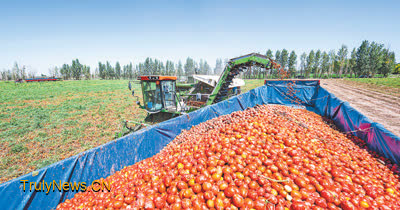Changji Hui Autonomous Prefecture in northwest China’s Xinjiang Uygur Autonomous Region has developed a complete tomato industrial chain in recent years.
This year, tomato planting areas for processed tomato products in China span 1.6 million mu (106,666.67 hectares), including 1.35 million mu in Xinjiang, according to Yu Chunshan, vice president of the Xinjiang Tomato Industry Association and general manager of Xinjiang Xiaochu Food Co., Ltd.

A harvester collects processing tomatoes in Siyuan village, Daxiqu township, Changji city, Changji Hui Autonomous Prefecture, northwest China’s Xinjiang Uygur Autonomous Region. (Photo/He Long)
Changji is one of the main tomato-producing areas for processing tomatoes in Xinjiang. Currently, the planting areas of processing tomatoes in the prefecture remain steady at over 250,000 mu, most of which are under a business model that features cooperation among companies and farmers. The average annual output value of the tomato industry in the prefecture exceeds 3 billion yuan (about $425.13 million).
Xu Bin, a tomato farmer from a village in Changji, grew four varieties of processing tomatoes on 2,200 mu of land this year. Xu has recently started harvesting this year’s batch, with a yield per mu reaching about 8.5 tonnes.
As Xu signed a contract with a processing company, which is responsible for varieties, transplanting, and mechanization of tomato production, he only hired 12 employees.
“In the past, I bought tomato seeds by myself and the yield per mu was about 4 to 5 tonnes. Now, with quality seeds and planting techniques from the company, the per-mu yield surged,” Xu said.
Most importantly, the contract with the company provides Xu with stability with guaranteed orders. Xu explained the contract model allows farmers to focus solely on boosting production. In addition, smoother logistics have resulted in Xu’s net income per mu surpassing 800 yuan.
The tomato processing companies themselves are also growing.
At the production workshop of COFCO Tunhe Changji Tomato Product Co., Ltd., four production lines operate 24/7.
This year, COFCO Tunhe Changji Tomato Product Co., Ltd. signed contracts with farmers to purchase tomatoes on 40,000 mu of land. The company has formed an industrial chain from seeds to processing.
An intelligent tomato processing plant of Xinjiang Xiaochu Food Co., Ltd., another tomato processing company in Changji, was put into operation in August.
“We plan to purchase 400,000 tonnes of processing tomatoes this year, directly helping about 100 households growing processing tomatoes increase incomes,” said Yu.
According to statistics, Changji has nurtured 25 tomato processing companies. They produce an average of more than 400,000 tonnes of tomato products annually, accounting for 35 percent of Xinjiang’s total output.
There are over 90 tomato processing companies in Xinjiang, with more than 90 percent primarily producing large-barrel tomato paste. As consumer demands change, many companies have started developing new products for the domestic market and expanding online sales channels.
“Now, many consumers in China pay more attention to nutrition and health, so there is a need for new products to meet these demands,” said Yu. “In response, we have developed products such as diced tomatoes, tomato chunks, and peeled tomatoes.”
Data from Taobao shows that recently, the search volume for Xinjiang canned tomatoes on Taogongchang (a part of Alibaba Group) has increased significantly, with a rise of over 1,000 percent compared to the beginning of the year. The daily sales volume has also seen growth.
Through the expansion of online sales channels, companies have obtained data-driven feedback on consumer demands and trends in the tomato industry, which is used to assist in the development of new products. According to consumer feedback, the company has developed products with smaller packaging, which are currently more popular on the Tmall platform.
With the participation of domestic retail e-commerce platforms like Taogongchang, the production of ready-to-eat tomato products continues to increase. The small-package diced tomatoes and canned tomatoes produced by COFCO Tunhe Changji Tomato Product Co., Ltd. have increased by about five times compared to last year.
“The market share of such products will continue to expand, and subsequently, more growers and companies may join this industry,” said Yu.